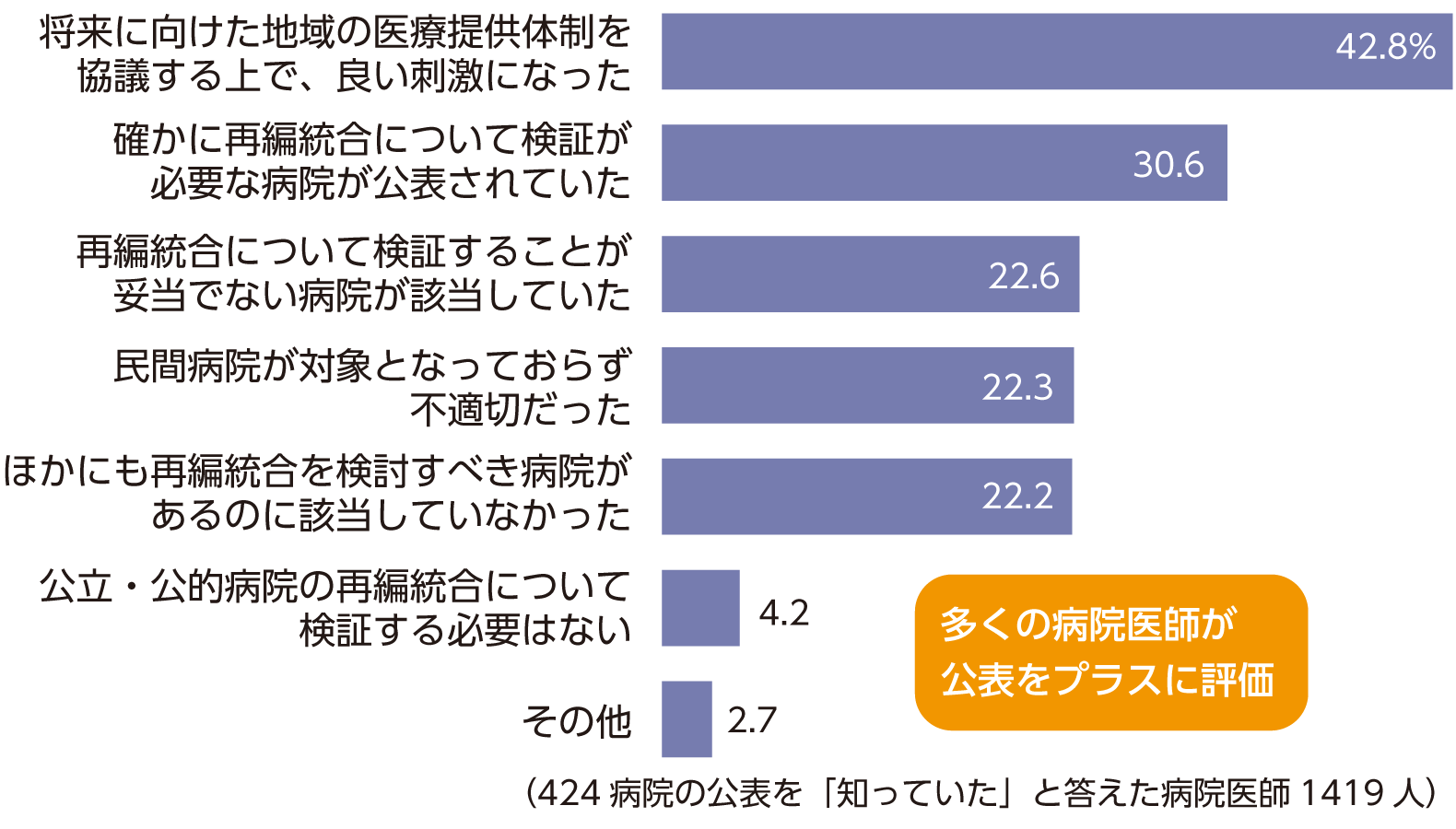ASOURCE®TIMES
2020年1月17日、厚生労働省は各都道府県知事に対し、医政局長名で「公立・公的医療機関等の具体的対応方針の再検証等について」という通知を送った。2020年秋までに、地域医療構想調整会議での公立・公的病院の再編・統合の再検証を求めており、地域の現状や将来像を踏まえた、医療提供体制の最適化に向けた議論の活性化が期待される。

公立・公的病院の再編・統合の再検証を求めた今回の通知は、2017年から始まった「地域医療構想」の調整会議が停滞していた事態を踏まえ、新たな方策を提示し、議論を進めさせようという厚労省の意図が反映されている。
地域医療構想は、いわゆる団塊世代が75歳以上になる2025年に向け、地域の医療関係者が協議し、適切な医療提供体制を自主的に再構築する取り組み。各構想区域(原則は二次医療圏)で調整会議を立ち上げ、2017年から議論が始まったが、将来の地域ごとの必要な病床数、病床機能の報告はあったものの、病院の再編・統合などの具体的な動きには結び付かなかった。
次に厚労省は、公立・公的病院に対して「新公立病院改革プラン」や「公的医療機関等2025プラン」を示し、将来の医療需要などを考慮してプランの妥当性を調整会議で協議してもらうこととした。へき地医療、救急、小児、周産期、災害、精神などの不採算・特殊部門の医療、民間では限界のある高度・先進医療など、公立・公的病院に期待される役割を果たしているかをチェックさせた。それでも厚労省の地域医療構想に関するワーキンググループは「プランに対する意見が少ない」と議論の低調さを指摘していた。
そこで、昨年9月26日にワーキンググループは、議論を活性化させる手段として、再編統合(病床削減や機能転換を含む)の必要性の再検証を求める424の公立・公的病院を公表した。この公表について、直後から新聞やテレビなどが報道し、該当病院の統廃合を促すかのような記事もあったことから、自治体首長、病院団体、病院職員、住民らに動揺が広がった。
全国知事会、全国市長会、全国町村会は「地域の個別事情を踏まえず、全国一律の基準による分析のみで病院名を公表したことは、国民の命と健康を守る最後の砦である自治体病院の機械的な再編統合につながりかねず、極めて遺憾」との共同コメントを発表した。
こうした事態を受け、厚労省は全国7カ所で自治体や病院の関係者らを対象とした「地域医療構想に関する自治体等との意見交換会」を開催、さらに病院団体や都道府県医師会などに対しても説明会を重ね、何とか趣旨が理解されたところで、この1月の通知に至った。
424病院は、全国1,652の公立・公的病院のうち、データを把握できる1,455病院について、がん、心疾患、救急、小児、周産期、へき地、研修・派遣機能など9領域における診療実績が特に少ない病院、あるいは、がん、心疾患、脳卒中、救急、小児、周産期の6領域で類似の診療実績を持つ病院が近接している病院が選定された。
ワーキンググループは「再編統合の方向性を機械的に決めたものではない。あくまで調整会議での議論を活性化するためだ」と強調した。これに対し、恩賜財団済生会や日本赤十字社などからは「公表の意図が周知されず、唐突」「該当病院の院長やスタッフがショックを受けた」といった声が上がった一方、「該当病院の診療実績が少ないことは事実であり、今後どうすべきかを地域や院内で検討したい」との前向きの意見もある。
現場の医師からは、再編統合の再検証が必要として公表された病院名については「妥当」「納得」との意見が過半数を占めている。
例えば、医師・医療従事者向けウェブサイトの『m3.com』が、医師会員を対象に実施した調査では、回答した7,259人のうち、再編統合となった病院について「妥当」「概ね妥当」と考える医師が53.1%と過半数を超え、「あまり妥当ではない」「妥当ではない」との回答(35.6%)を大きく上回った(図1)。また、2025年までの医療提供体制については「見直しが必要」(29.9%)、「ある程度見直しが必要」(54.7%)で、84.6%が何らかの見直しが必要だと回答している。
同じく医師・医療従事者向けウェブサイトの『日経メディカルオンライン』が、病院経営者と病院勤務者を対象に実施した調査では、424病院の公表について「知っていた」と答えた1,419人のうち60.9%が公表について「納得できる」「おおむね納得できる」と肯定的に受け止めていた。その理由については、「将来に向けた地域の医療提供体制を協議する上で、良い刺激になった」(42.8%)、「確かに再編統合について検証が必要な病院が公表されていた」(30.6%)との回答が多かった(図2)。
再編統合に向けた再検証が必要な病院名の公表は、厚労省の狙い通り、停滞しがちだった地域医療構想の議論に一石を投じたといえよう。
図1 公表された424の公立・公的医療機関等の病院名の妥当性

出典:m3.com
図2 424病院の公表に関する評価

出典:日経メディカルオンライン
ただし、地域医療構想の実現に向けて議論が盛り上がるかどうかは、不透明な部分もある。現在の医療提供体制の見直しが必要という認識が現場で共有されていることは、先述の2つの調査から浮かび上がる。しかし、総論賛成でもいざ自分の勤務先の病院がその対象となると、各論での議論には二の足を踏む関係者が少なくなさそうなデータがある。
『m3.com』の調査で、再検証の対象病院に勤務している医師(493人)では、公表された病院名について「あまり妥当ではない」「妥当ではない」が合わせて53.4%と半数を超えていた。対象でない病院の医師(2,371人)の過半数(56.4%)が「妥当」「概ね妥当」と回答したのと対照的だ(図3)。再編統合は必要でも、自分の身に降りかかると納得しかねる、というのが現場の本音といえそうだ。
実際、病院の統廃合を進めるとなると、それぞれの病院が持っていた機能の集約や転換、病床の削減などが必要となる。医師、看護師ら医療従事者だけでなく、事務部門の職員も含めた人員の配置を替えたり削減したりするなど痛みを伴うため、経営者が決断するには多くの障害が立ちはだかる。公立病院の場合は、自治体の首長が病院の存続や増改築などを選挙公約に掲げていることもあり、政治的な問題も絡んでくる。
再検証が必要との評価を下すために「病床機能報告」のデータを用いたことへの不満もくすぶる。病床機能報告は各病院の医療機能を報告するもので、地域の人口構成がどう変わり、どういう患者が増えたり減ったりするのかという医療需要を反映していないというのがその理由だ。こうした声に厚労省がきちんと答える必要も出てくるだろう。
現在厚労省では、それぞれの地域医療構想調整会議の進捗状況や今後の日程の確認を進めている。それらの回答を基に、2020年9月までに方針を決めるとしている再編・統合の再検証の期限を延長することも考えているという。
図3 勤務先が対象病院で「ある」か「ない」かでの回答の違い

出典:m3.com
病院名公表の狙いについて
今般の公立・公的医療機関等の診療実績データの分析は、医療需要が増大する2025年に向けて、質が高く効率的で不足のない医療提供体制を構築するために、病床の機能分化・連携を進める「地域医療構想」の実現に向けた取組として行ったものです。
地域医療構想は都道府県が策定するものであり、2016年度には全ての都道府県において策定いただき、2017年度から2018年度は、その実現に向けた取組として、これまで急性期機能を中心に担ってきた公立・公的医療機関等に対し、民間では担えない政策医療に重点化すべきとの観点から、今後担う医療機能について検討するよう求めてきました。
しかしながら、その検討結果については急性期からの転換が進んでいないとの指摘がなされており、構想の実現に向けた更なる取組として、今般、公立・公的医療機関等の急性期機能等に着目した客観的なデータを分析し、その結果をもとに、それぞれの地域や医療機関において、今後の医療提供体制のあり方を改めて考えていただくこととしました。
分析結果は病院の統廃合等の方向性を機械的に決めるものではなく、あくまで地域の議論を活性化するための材料として示したものです。地域で議論いただく際には、分析結果も踏まえつつ、今回の分析では反映できない地域の実情に関する知見を補いながら、将来を見据えた医療提供体制の構築に向けて、議論を尽くしていただきたいと考えております。
公表後の各方面からの反応について
今回の取組を受けて、地方からは「唐突に公表された」「地域住民に不安が広がっている」等のご指摘をいただいたことから、国として説明責任を果たすべく、これまで全国各地で自治体や医療関係者等が参加する意見交換会を開催してまいりました。
意見交換に出席いただいた方々からは、今回の取組について「全国一律の基準で分析されており、地域の実情が反映されていない」「分析結果の撤回を求める」など、厳しいご意見をいただく一方で「今後安心して医療を受けるためには、再編統合の取組が不可欠である」といったご意見もいただきました。
現在も希望のあった自治体等と個別に意見交換を開催しており、今後も引き続き、自治体や医療関係者等のご意見を丁寧に伺いながら、地域医療構想の実現に向けた取組を進めてまいります。
病床削減・再編統合を促す政策について
医療機関の機能再編や統廃合等を内容とする医療提供体制の議論を地域で進めていく上では、住民も含め、地域の合意形成をどう図っていくのか、再編統合に伴う費用をどう工面するのか、が重要になると考えています。このため、厚生労働省としても、データ分析や関係者調整等を国が集中的に支援する「重点支援区域」の選定や、従来の地域医療介護総合確保基金の拡充、同基金では対処できない再編統合に伴う経費を補助する新たな病床ダウンサイジング支援を実施することとしています。
これらの取組を通じて、各地域において、将来を見据えた医療提供体制の構築に向けた議論が着実に進むよう、国として最大限支援してまいります。